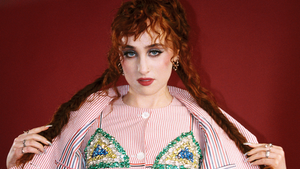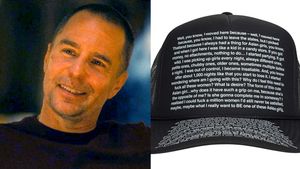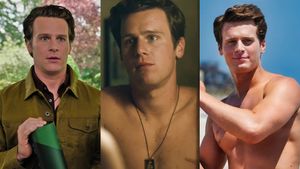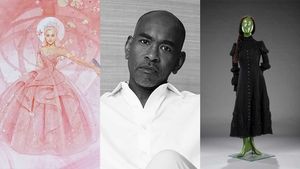Maia Sharp leans over a piano at Los Angeles's Silent Movie Theatre, crooning into a vintage microphone, while the stars of the silver screen flicker overhead. "I know I hold the smoking gun," she sings, as a woman onscreen stares forlornly into the distance. "But clearly, anyone would rather be you after me..."
The music video's director calls for a break. The song,
"Me After You," is cut off, and the woman's misty-eyed countenance freezes. Moments later, Sharp is leaning against the counter of the lobby's concession stand, surrounded by old movie posters. Dark hair tumbles to her tuxedo shirt, her bowtie coquettishly undone.
"We put together scenes from silent films that reflect the emotion in the song," explains the singer, whose album, Change the Ending, will be released August 28. "And just like in the old-time movies, where they'd have somebody playing live, I am the orchestra. I give the silent movie its sound."
Sharp has been providing sound for a lot of artists over the years. A prolific songwriter, she's written music for some of the industry's best, including Cher, Bonnie Raitt, The Dixie Chicks, and Art Garfunkel. But she's a star in her own right, too. Change the Ending is Sharp's fifth solo album, and also the first that she's independently produced.
Sharp devoted six months to produce songs that she's written over the past decade for the album. "I took some long walks," Sharp says. "It takes a little longer when there's no one else to bounce things off of."

She credits her father, songwriter Randy Sharp, as a major influence in her music career. "I feel like I'm writing with a friend," Sharp says. "I don't have to edit what I'm saying because I'm talking to a parent. We can be real, and explore, and write the story."
Because of her parents' talents, Sharp grew up surrounded by music -- there was always a guitar or piano around for her to play. The osmosis worked and, at the age of 14, Sharp cut her performer's teeth by playing the saxophone in various Los Angeles clubs. In fact, the tenor sax remains one of her favorite instruments. By 19, the budding artist began writing songs of her own. She fell in love with creating music and decided to make it her career.
Unlike many performers in the entertainment industry, Maia chose be open about her sexual orientation. At the age of 23, she came out as a lesbian.
"I have to say, it didn't feel like a big deal," she says. "I almost feel bad that I didn't have a harder time, because a lot of people do. I wasn't this hugely famous person when I came out. So, by the time people got to know who I was, it had already been out there for years."
But even in her personal life, coming out was a non-event. "Family-wise, it wasn't an issue," Sharp says. "And that was total luck of the draw that I have folks who said maybe the coolest thing to me that I've ever heard as a reaction. They said, 'You know what? If we have a problem with this, it's our problem, not yours. So we will work it out.' And that was that. They totally love and embrace my partner of 15 years. She's family, so I've been very lucky on both the personal and the business fronts."
Sharp's partner, Meg, visited the theater earlier in the day. Blonde and affable, she greeted everyone on set by name before watching Maia perform. "She looks good," Meg says. "But then, she always looks good."

Sharp, now a sustaining donor at the L.A. Gay and Lesbian Center, feels fortunate about her own positive coming out experience. But she acknowledges, sometimes through her music, the anxieties she wrestled with as a closeted teenager. Her song, "Standing Out in a Crowd," previously recorded by Trisha Yearwood, directly addresses the insecurities associated with feeling different:
"But in my world, different meant lonely. / The last place I wanted to be / was standing out in a crowd / where the spotlight finds you and singles you out."
"I wanted to give the song a darker slant," says Sharp, who praised Yearwood's version, but sought to find a means of making the song her own again. "I wanted to capture how it felt when you're on the outside looking in. There's a period in everyone's life where they feel like they don't fit, like they don't belong. I felt that way when I was younger. I had friends, but I always felt like I had a different thing going on. I didn't know there were others like me until high school. Even living in Los Angeles... being a little girl attracted to other little girls is not embraced in any of the movies."
Perhaps it's appropriate then, that the album, Change the Ending, has more than a few nods to Hollywood--the cover art is a mock movie poster, with Sharp featured as its star. The message is clear: she has embraced her place in the spotlight. And while the actors in her video may be silent, Maia has certainly found her own voice through music. "I figured it out. I'm not even sure what age I was when I did figure it out. I'm really okay. And not just okay. I love my life. I love that I'm different. I don't want to be like everyone else."
Maia Sharp's album,
Change the Ending, is available today, and she's touring nationwide this fall. For tour dates,
visit MaiaSharp.com.
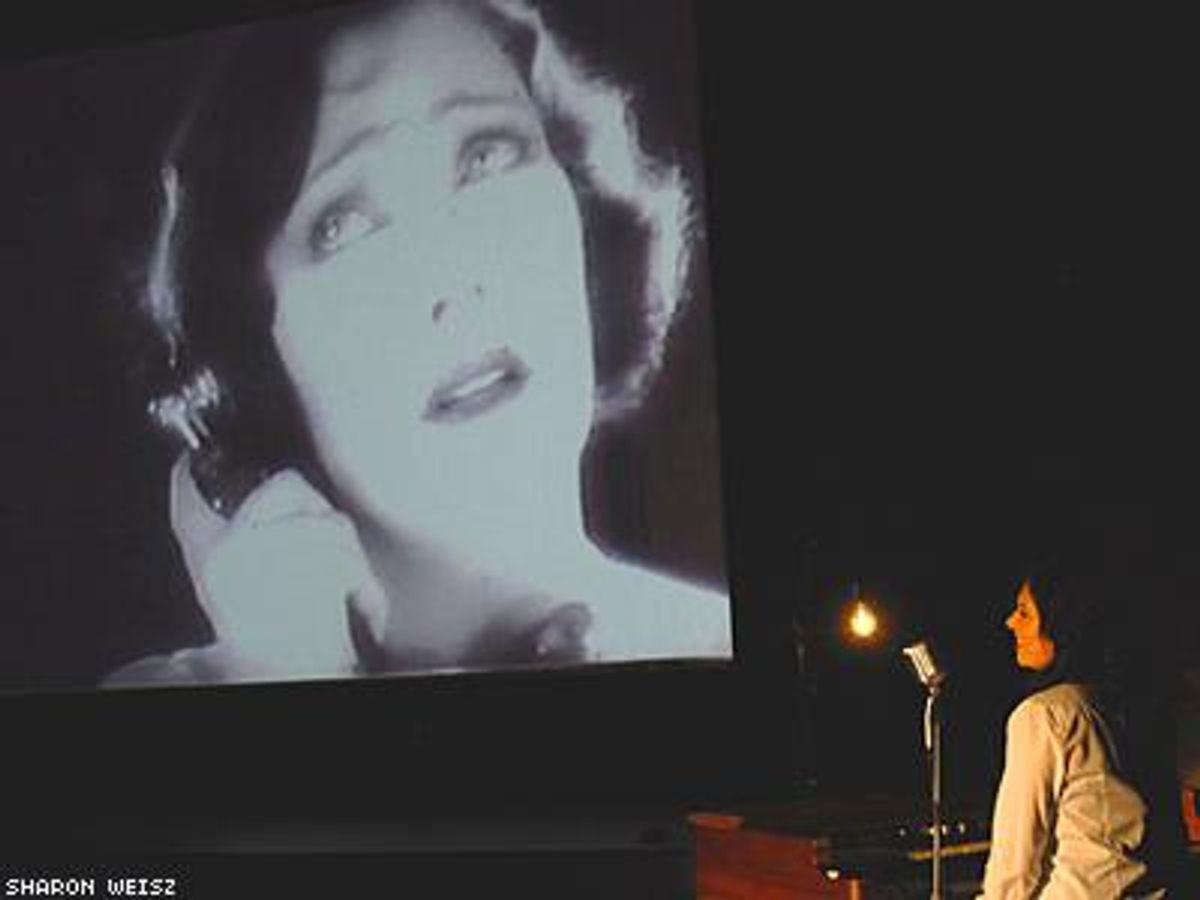

 She credits her father, songwriter Randy Sharp, as a major influence in her music career. "I feel like I'm writing with a friend," Sharp says. "I don't have to edit what I'm saying because I'm talking to a parent. We can be real, and explore, and write the story."
She credits her father, songwriter Randy Sharp, as a major influence in her music career. "I feel like I'm writing with a friend," Sharp says. "I don't have to edit what I'm saying because I'm talking to a parent. We can be real, and explore, and write the story." Sharp, now a sustaining donor at the L.A. Gay and Lesbian Center, feels fortunate about her own positive coming out experience. But she acknowledges, sometimes through her music, the anxieties she wrestled with as a closeted teenager. Her song, "Standing Out in a Crowd," previously recorded by Trisha Yearwood, directly addresses the insecurities associated with feeling different:
Sharp, now a sustaining donor at the L.A. Gay and Lesbian Center, feels fortunate about her own positive coming out experience. But she acknowledges, sometimes through her music, the anxieties she wrestled with as a closeted teenager. Her song, "Standing Out in a Crowd," previously recorded by Trisha Yearwood, directly addresses the insecurities associated with feeling different:



















